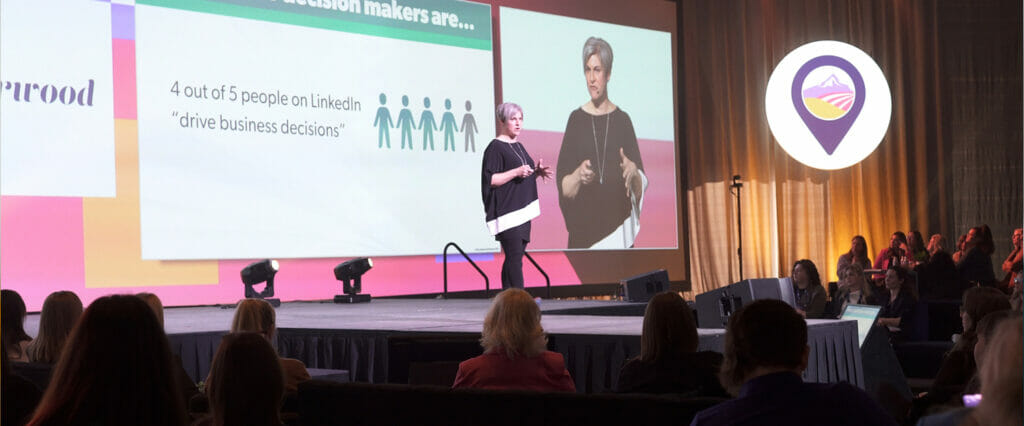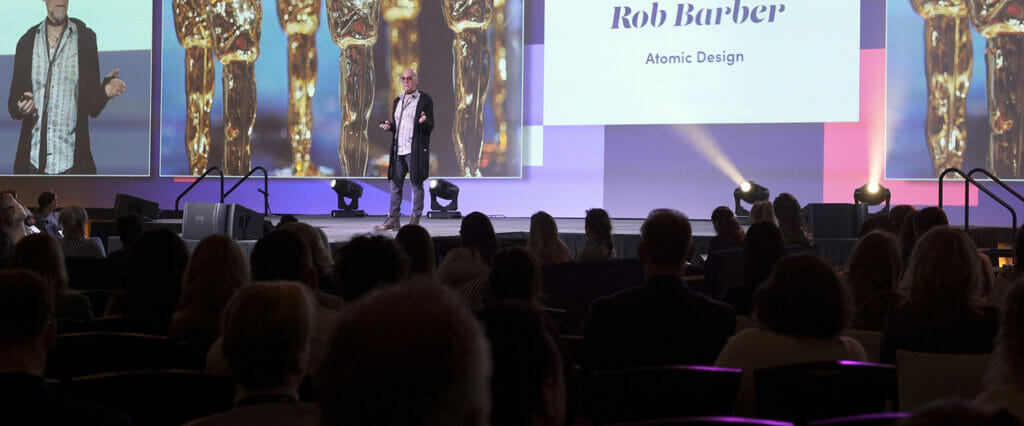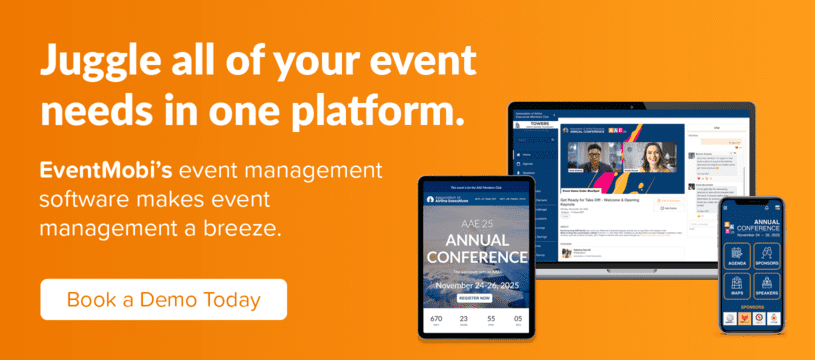Event Speakers: How To Find, Introduce and Thank Your Guests
Think back: what do you remember about the event speakers from your most recent event? Did you learn something invaluable, connect with a new thinker, or feel inspired to try some fresh ideas afterwards?
Getting the right speakers for your event can make or break the success of your conference, trade show, or seminar.
You’re not just looking for someone who can fill a slot in your schedule; you need dynamic individuals who can captivate an audience, communicate effectively, and make your event truly memorable.
But finding the perfect speakers can sometimes feel like searching for a needle in a haystack! That’s why we’ve created this guide to help you find, attract, and hire the best speakers for events to ensure your next event is a resounding success.

Types of Professional Event Speakers
When planning an event, the array of events speakers available can feel overwhelming.
Let’s break down the types of professional speakers you might consider, tailored to the specific event you’re hosting.
Event speakers for conferences
- Keynote speakers. These are the heavy hitters of your event—the ones who set the tone and theme. They’re usually recognized experts in their fields or celebrities who can draw a crowd.
- Thought leaders. Thought leaders bring fresh insights and new perspectives to your audience. They are visionaries in their fields, and their unique takes can spark creativity and innovation among attendees.
- Workshop leaders. Interactive, hands-on learning is their game! They facilitate in-depth sessions that dive deeper into specific topics, providing attendees with valuable practical skills they can apply immediately.
- Motivational speakers. Want to energize and inspire your audience? Motivational event speakers are your go-to. They deliver powerful messages that drive attendees to take action, make changes, or overcome challenges.
- Entertainers. Conferences shouldn’t be all work and no play! Entertainers add a fun twist to your event, providing enjoyable interludes between serious discussions or a lively end to a full day of learning.
- Moderators. Your audience’s guide to panel discussions, moderators keep conversations on track and ensure all voices are heard. A good moderator can make a panel discussion a highlight of the event!
- Panelists. Experts or experienced professionals in their field, panelists offer varied perspectives on a specific topic, promoting stimulating discussions and knowledge sharing.
The right event speaker can also act as a powerful part of your event marketing strategy. Learn how you can leverage speakers to advocate for your event.

Guest speakers for corporate events
- Leadership experts. Ideal for corporate retreats or internal development days, these event speakers focus on fostering strong leadership skills and cultivating effective leaders.
- Motivational speakers. As with conferences, hire a presenter as a motivational speaker to inspire your corporate audience, encouraging team unity and personal growth.
- Industry experts. Want to keep your team ahead of the curve? Industry experts bring the latest trends and insights, helping your team stay competitive and informed.
- Wellness experts. Guest speakers for workplace events focused on employee well-being can be wellness experts who offer tips on stress management, work-life balance, and overall health.
- Diversity, Equity, and Inclusion (DEI) advocates. These event speakers promote a more inclusive and equitable workplace, educating your team on the importance and benefits of diversity.
Different events will call for unique types of speakers! For example, a nonprofit event might need fundraising experts, while a book festival would seek out well-known authors. Understanding your event’s purpose and audience will help you determine the right type of event speaker to hire.
How To Find Speakers for an Event
Now that we’ve discussed the types of event speakers, you might be wondering, “how do I find a good event speaker?” The hunt might seem daunting, but fear not! With these strategies, you’ll be booking amazing event speakers in no time.
- Be active in your space. Familiarize yourself with key figures, trends, and discussions in your industry. By staying in the loop, you’ll know who’s making waves and who would make a fantastic addition to your event.
- Look to past events. Review the event speakers who performed exceptionally well at previous events. Past success could be a good indicator of a repeat performance!
- Speakers bureau. These agencies represent speakers, making it easier for you to find and book them. Remember, bureaus usually charge a fee, so factor that into your event budget.
- Speaker websites. Many speakers have personal websites where they showcase their speaking portfolios. This is a great way to gauge their style, credibility, and how they resonate with your audience.
- Associations & chambers of commerce. These organizations often host speakers and can provide recommendations. They’re especially handy when looking for speakers with specific industry knowledge.
- Survey attendees and members. Ask your attendees who they want to hear from. Not only does this generate ideas, but it also builds excitement for your event.
- Explore competitive events. Scope out the competition. Who are they booking? You might discover some gems!
- Follow people on social media. Social platforms are a gold mine for finding influential voices. Keep an eye on the movers and shakers, and don’t forget to check who’s trending.
- Network, network, network. Never underestimate the power of a solid network. You never know where your next great speaker recommendation might come from!
- Follow relevant industry platforms. From podcasts to TikTok, industry-specific platforms could lead you to your next event speaker. Plus, they give you a sense of a speaker’s style and audience engagement.
- Post a call and advertise it. If you’re open to applications, post a call for event speakers and advertise it widely. You’ll be amazed at the undiscovered talent out there.
- Local and industry publications. These sources often feature thought leaders and influencers. Plus, they could offer a wealth of topics and issues relevant to your audience.
- Partner recommendations. Partners can offer valuable insights and suggestions. They may know of great speakers who align with your event’s goals.
With guest speakers for events, aim for a mix of up-and-coming talent, established frontliners, and industry standbys. This variety ensures a dynamic event and keeps your audience engaged and excited.
Remember, finding the perfect event speaker might take a bit of time and effort, but the payoff is a memorable event that leaves a lasting impression on your attendees. Happy hunting!
How Much Do Public Speakers Make per Event?
You might be wondering, “Just how much is a speaker fee for an event going to cost?” The answer to that is as varied as the speakers themselves.

The price range is vast, from speakers who work for free to those who rake in hundreds of thousands of dollars for a single event.
The amount a speaker charges is dependent on various factors. Let’s unpack a few:
- Location of the event. If your event is in a major city or desirable location, you might attract speakers at a more manageable rate.
- Audience size. A room filled with hundreds of industry leaders could warrant a higher fee than a small, intimate gathering.
- Type of event. High-profile corporate events or large conferences may cost more than smaller workshops or seminars.
- Duration of stay. If your speaker is required to stay for the entire event, expect to pay more than if they were just delivering a keynote and leaving.
- Creation of new content. A speaker developing a unique presentation specifically for your event may charge more than for a rehearsed speech.
- Travel requirements. If a speaker has to travel a long distance, they may charge more to cover their time, travel, and accommodation expenses.
- Level of contribution. A seminar speaker leading a breakout session or acting as a panelist might charge less than a keynote speaker. The more they contribute to your event, the higher their fee.
- Partnership opportunities. If there’s potential for an ongoing relationship or other forms of collaboration, a speaker might lower their fee.
- Establishment in the field. A well-known speaker, industry leader, or celebrity guest speaker for events will usually come with a higher price tag than someone who’s newer to the scene.
Now, if your budget is tight, don’t lose heart! You can often find great event speakers who are willing to share their knowledge for free. Offering partnerships with mutual benefits—like publicity or networking opportunities—can attract these gems to your event. That’s how to get speakers for an event, even if you’re short on funds.
So, what is the average cost of a guest speaker? There’s no single answer. But remember, the value they bring to your event—like audience engagement, expert insights, and added credibility—is often worth the investment.
How To Invite Speakers to an Event
Alright, now you’re armed with the knowledge of what event speakers might cost. The next step? The exciting process of inviting them to your event! Don’t be daunted by the administrative work—it’s easy once you know the steps.
- Identify speakers. Start with a list of your dream event speakers. These could be experts, industry leaders, or up-and-coming voices. And hey, dreaming big never hurts!
- Set the fee. This is a crucial step. You need to decide how much you’re willing to pay for each speaker. This could be based on their popularity, experience, or how much value they bring to your event. Just remember, some speakers have set fees, and they may not match your budget.
- Write your invitation email. Now, it’s time to craft your invitation. Be sure to include why you think they’d be a great fit, details about the event, and what you’re willing to offer them. Remember to be respectful and professional, but let your excitement shine through!
- Create an intake form. This is a handy tool for gathering information about your speakers. Think of it as a mini resume for them to fill out, detailing their background, speaking experience, and presentation topic.
- Follow up. Don’t be shy about checking in if you don’t hear back in a reasonable time. People get busy, and your invite may have gotten lost in the shuffle. A friendly nudge can go a long way!
- Get contracts signed. Once a speaker agrees to participate, it’s time to get it in writing. A signed contract helps protect both parties and outlines expectations clearly.
- Send an information pack. After the paperwork is done, it’s time to send your speakers a packet of information. This could include event logistics, presentation guidelines, and even tips to make their stay more comfortable.
- Make sure they know what’s happening on the day of. A few days before the event, reach out with a final itinerary and any last-minute information. This ensures everyone is on the same page and ready to rock your event!
How To Book a Keynote Speaker
If you’ve ever attended an event with a knock-your-socks-off keynote speaker, you know the electrifying effect it can have. But how do you go about booking one of these crowd magnets? Here’s a step-by-step guide to booking your dream event keynote speaker:
- Start early. The early bird gets the worm, or in this case, the speaker! Start your search early, about 2-6 months ahead of your event. The best speakers are often booked well in advance.
- Get your event information in place. Before you reach out to potential speakers, make sure you have your event details nailed down. This includes the date, budget, and location of your event.
- Do your research. Not all event speakers are created equal, and not all of them will be a good fit for your event. Spend some time digging into their past presentations, specialties, and audience reactions to see if they’re a match.
- Review speakers. Once you’ve done your research, it’s time to review potential speakers. Look at their experience, presentation style, and feedback from past events.
- Create a list. Don’t put all your eggs in one basket. Make a list of potential speakers, knowing that you might not land your first pick.
- Write your pitch. You’ve got your list, now it’s time to pitch. Outline why you think they’d be great for your event, and why your event would be great for them.
- Outline the request clearly and briefly. Keep your request short and sweet. Be sure to include key details like the date, topic, audience, and what you hope they’ll bring to the event.
- Send it to them or their agent. Once your pitch is ready, it’s time to send it off. If the speaker has an agent, that’s who you’ll be dealing with.
- Negotiate. You’ve sent your pitch, and they’re interested. Now it’s time to negotiate! This could involve fees, travel arrangements, presentation length, and more.
- Confirm booking. Once everything is agreed upon, it’s time to confirm the booking. This usually involves signing a contract and paying a deposit.
- Assign them a communication lead. Lastly, assign someone from your team to be their point of contact. This person will keep them updated on any event changes, answer questions, and ensure they have everything they need.

How To Introduce a Guest Speaker

The stage is set, the audience is seated, and it’s showtime! Now, it’s your job to introduce the guest speaker. This is a crucial moment, as it sets the tone for the speech to follow. So, how do you nail the perfect introduction? Here are some key steps:
- Let them know how they’ll be introduced. Before the event, talk to your speaker about how they’d like to be introduced. Get their approval on your introduction to ensure they’re comfortable with what you’ll be saying.
- Collect bio. Gather information about the speaker’s background, achievements, and professional experiences. This will give the audience a sense of who they are and why they’re qualified to speak on their chosen topic.
- Get name pronunciation. There are few things worse than mispronouncing a speaker’s name. Confirm the correct pronunciation with the speaker ahead of time to avoid any awkward situations.
- Give relevant information. Your introduction should include relevant information that ties the speaker to the topic of the event. This could be their expertise, experiences, or any significant contributions they’ve made to the field.
- Keep the energy high. The introduction sets the tone for the rest of the speech. Be enthusiastic and energetic to get the audience excited.
- Practice enunciation. Practice your introduction to ensure clear enunciation. Stumbling over words can distract from the speaker’s credentials.
- Keep it short. Remember, the introduction is not the main event. Keep it brief, concise, and engaging.
- Shout out awards and recognitions. If the speaker has any notable awards or recognitions, mention them. This helps establish their credibility and gives the audience a reason to listen closely.
- Give them the reins. End your introduction by welcoming the speaker to the stage. This is their moment to shine, so gracefully pass the baton to them.
Sample introduction message
And that’s how to introduce speakers at an event! Let’s put it all together into an example speaker introduction:
“It’s my privilege to introduce our next speaker. A recognized expert in digital marketing, and the recipient of the prestigious Marketer of the Year Award, she has revolutionized the way we think about online advertising. She has not only written extensively on the subject but has also successfully implemented her strategies in numerous organizations worldwide such as [relevant organizations]. Please join me in welcoming our esteemed guest, [Speaker’s name].”
Voila! That’s how you set the stage for a compelling speech. Remember, a good introduction is a springboard for your speaker, launching them into their presentation with momentum and enthusiasm.
How To Thank a Guest Speaker
A guest speaker can truly elevate your event! Their expertise, charisma, and insights add an extra layer of excitement and engagement for your attendees. That’s why you need to show your appreciation and thank them appropriately—it makes a difference in convincing them to return as a speaker in the coming years. Here are a few ways you can do that:
- Provide speaker gifts. Unwrapit recommends thanking event speakers with unique, personalized gifts. For instance, you might gift a keynote speaker who loves to write a personalized leather journal or one who loves coffee an espresso machine.
- Shout them out at the event. A heartfelt thank you from the stage, acknowledging the value they brought to your event, is a great start. Or, if your event has a reception or a VIP meet and greet, you can personally thank your speaker and introduce them to other significant guests.
- Feature them in post-event collateral. Mention your speaker in post-event communications, such as newsletters or social media posts, and express your gratitude there. This will not only show your appreciation but also boost their visibility.
- Send a personalized email. This allows you to express your gratitude in a more detailed and personal way, speaking to the value of their specific contributions.
- Conduct a post-event speaker survey. Gathering feedback with a post-event survey shows that you value their opinion and are keen to improve the experience for future speakers.
- Write a testimonial. If your speaker was a hit, consider providing a testimonial they can use on their website or promotional materials. This expresses your appreciation and can help them land future speaking engagements.
By expressing your gratitude with small gifts or messages, you’re not only making your speaker feel valued, but you’re also building a strong relationship that could lead to future collaborations. Remember, a little thank you can go a long way!
Wrapping it Up
There you have it, folks! Your all-inclusive guide to securing the best speakers for your event. From differentiating between the types of professional speakers to understanding their fees, inviting them, booking them, introducing them on stage, and thanking them afterward—we’ve covered it all.
Speakers are the heart and soul of many events. They bring the knowledge, the energy, and the spark that make your event memorable.
But let’s not forget the role of technology in making your event a success! Using an event management platform like EventMobi can make your life much easier. With EventMobi, you can build out an event schedule and manage speakers with ease, letting you focus on creating the best possible experience for your attendees.
